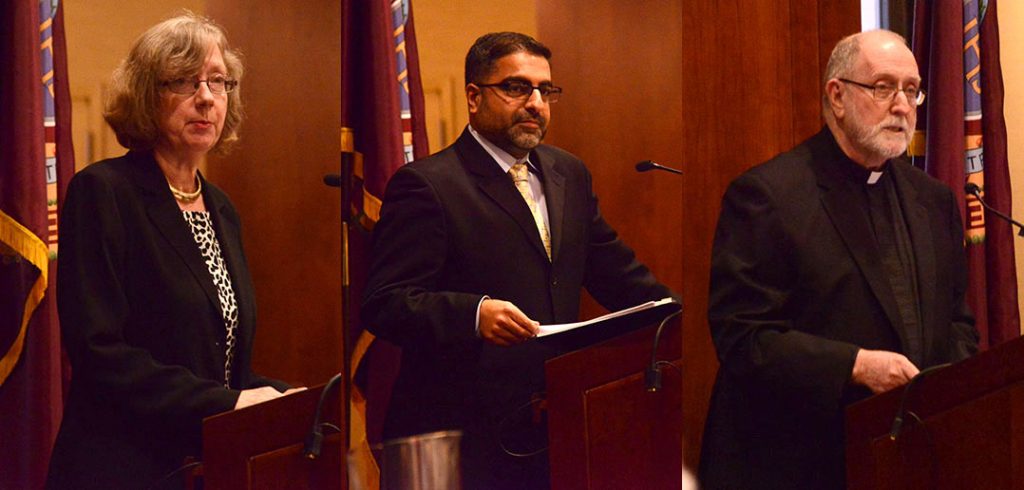“Freedom is just another word for nothing left to lose,” sang Janis Joplin.
Patrick J. Ryan, SJ, the Laurence J. McGinley Professor of Religion and Society, quoted Joplin’s lyrics at the annual Spring McGinley Lecture on April 14, titled, “Poverty: the Curse and the Blessing – Jewish, Christian, and Muslim Perspectives.”
In a lecture filled with historical detail, the blues singer’s quote struck a modern note. But it also served to illustrate the transition in the scriptures and history when poverty shifted from being perceived as a curse to being perceived as a blessing, or “from literal penury to a certain spiritual freedom.”
Father Ryan’s talk did make distinctions between freely chosen poverty and abject poverty. He traced the views of the three great monotheistic religions on poverty and punctuated his remarks with contemporary anecdotes.
He described today’s impoverished scholars in New York’s ultra-Orthodox Jewish Hasidic communities, where a number have been reduced to poverty because they choose to study the Torah and Talmud over gainful employment.
He was critical of a recent editorial that frowned on the practice, and said that it was often such indigent scholars who preserved the Hebrew Scriptures since the Babylonian Exile.
Father Ryan said he had known thirty-five years ago a Ghanaian Muslim mystic called Malam Baba (“Papa Teacher”) who had freely chosen to be poor. He sought to ask the wise man historical questions, but the mystic, whose real name was Musa ibn Muhammad, wanted only to discuss Father Ryan’s experience with God.
“His radical detachment amazed me,” said Father Ryan. “I finally stopped taking any notes on our conversations: we had become brothers in our poverty, in our need to seek enrichment from God alone.”
He then referred to Pope Francis’s commentary on Wall Street—“How can it be that it is not news when an elderly homeless person dies of exposure, but it is news when the stock market loses two points?”
He noted that when the pope was elected the Brazilian Franciscan Cardinal Claudio Hummes whispered in his ear “Don’t forget the poor people,” at which point the pope chose the name Francis, from Saint Francis of Assisi, also known as Il Poverello, the poor man of Assisi.
“I don’t think the new poverello will leave Rome unchanged,” said Father Ryan.
In her response, Claudia Setzer, PhD, professor of religious studies at Manhattan College, said that the Jewish tradition doesn’t see poverty as a virtue or wealth as a vice. However, the “potential blindness of privilege” could fester into a problem, “especially if one has never known anything else.”
She said being aware of one’s advantage should be paramount. For example, if you have a day laborer, “you shall pay them their wages daily before sunset, because they are poor and their livelihood depends on that,” she said quoting Deuteronomy.
Hussein Rashid, PhD, an adjunct assistant professor at Hofstra University and also at Fordham, said that charity in the Muslim tradition is to give more than you need.
“Giving isn’t about the self but [about]creating a situation so that people would be able to worship God,” he said.
Charity should not create a sense of servitude on the part of the receiver, he said, and he warned against overemphasizing the special relationship of the poor with God.
“By treating the poor as something different, we further dehumanize them,” he said. “It’s easy to romanticize the poor, but it masks exploitation.”

